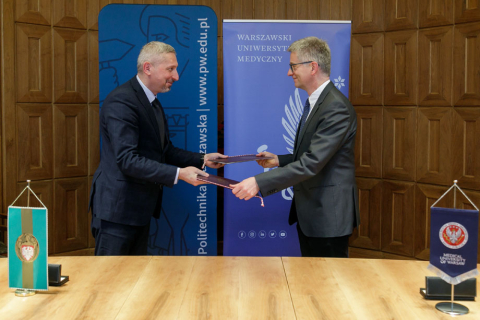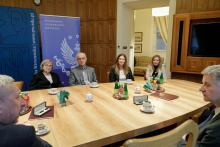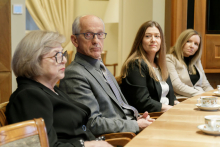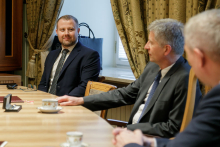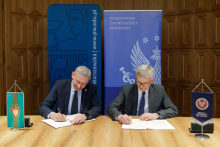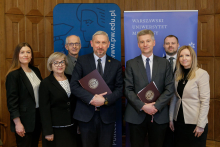Cluster of New medical technologies supports innovation
NTMed includes enterprises, scientific institutions, R&D units, public and non-public universities operating in the field of medicine and pharmacy. It was established in December last year. At that time, 15 entities joined it. Our university joined on Friday, February 24, under an agreement signed by Prof. Piotr Pruszczyk, Vice Rector for Science and Technology Transfer MUW, and Prof. Mariusz Malinowski, Vice Rector for Science WUT (Warsaw University of Technology). Prof. Piotr Pruszczyk: - The dynamic development of medical, pharmaceutical and health sciences is a great opportunity, but also a great challenge for our university. MUW has enormous intellectual and scientific potential, as well as extensive research infrastructure. All this makes that MUW offers a unique in the country multidisciplinary platform for innovative research in all scientific disciplines represented at MUW.
The cluster works to increase access to innovative technologies for medical devices and medicinal products and to provide conditions for effective commercialization of research results. It supports rapid technology transfer, development of start-ups, increases access to research infrastructure and research services of scientific entities. Cluster members carry out joint projects to effectively use their scientific potential. Our university, using the status of NTMed member, will receive support for R&D processes (research and development work) in the area of biotechnology of medicinal products and medical devices. And it will have the opportunity to consult developed technologies with scientific teams and build a joint research agenda. Prof. Sebastian Granica, head of the Department of Pharmaceutical Biology, will represent MUW in the cluster.
Present at the signing were Dorota Szubstarska, Director of Scientific and Didactic Projects at MUW, and Dr. Piotr Sobieraj from the Department of Internal Medicine, Hypertension and Angiology UCC MUW, Deputy Directors of the Center for Advanced Materials and Technology CEZAMAT: Prof. Elżbieta Malinowska and Aleksandra Mościcka-Studzińska and Prof. Zbigniew Brzózka from the Department of Medical Biotechnology MUW. Dorota Szubstarska: - MUW's participation in the network can contribute to the development of new therapies and diagnostic methods that will allow us to fight for the life and health of patients more effectively. The long-term benefit is increased accessibility to innovative therapies and improved national health security.
Cooperation between MUW and WUT
The agreement, signed on February 24, marks the next stage of cooperation between MUW and WUT. The beginning of this cooperation was the signing of a document identifying joint strategic research areas in January this year. As MUW rector Prof. Zbigniew Gaciong emphasized then, the University of Technology is an ideal partner for our university, as it offers modern technologies on which modern medicine is based. More about the signing of the agreement between MUW and WUT
Scientific activities of MUW
Medical University of Warsaw is currently conducting more than 250 scientific researches (preclinical and clinical research) in the fields of medical, pharmaceutical and health sciences. These researches concern: pathophysiology, new diagnostic methods, effective innovative drug therapies, health care, disease prevention, health promotion, and novel therapies and new drugs. Among other things, the researches focus on issues related to the prevention, diagnosis and treatment of social and civilization diseases, but also rare diseases, support of interdisciplinary medical research and optimization of therapies in the formula of non-commercial clinical trials.
